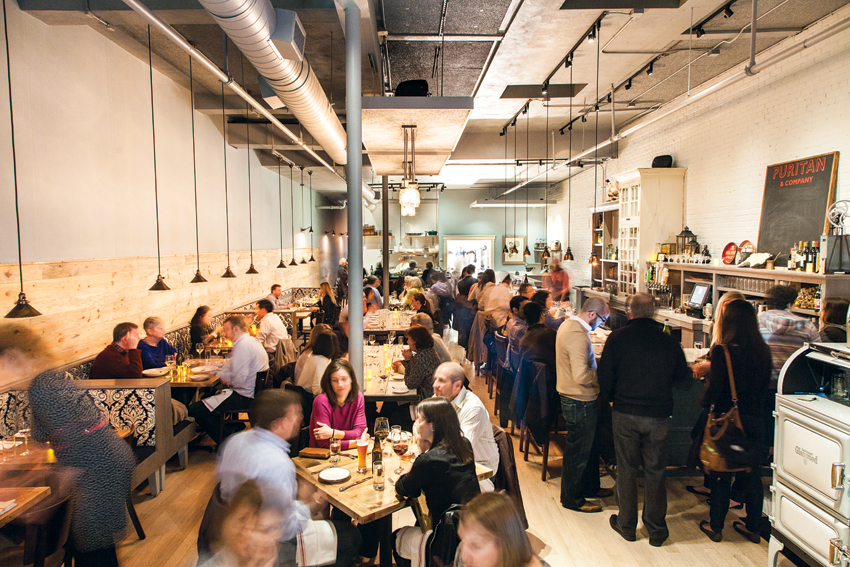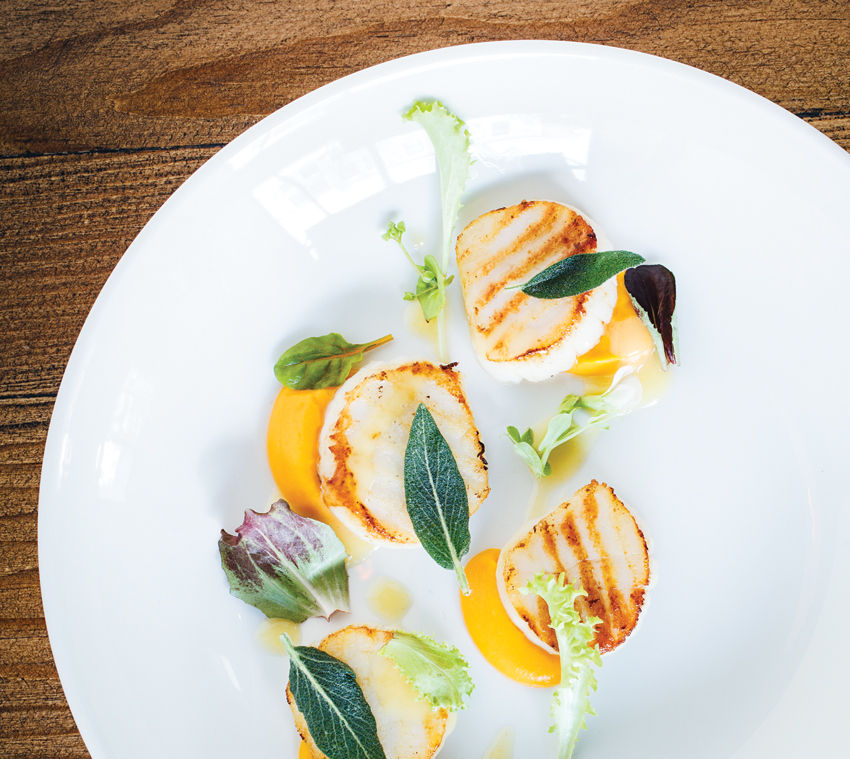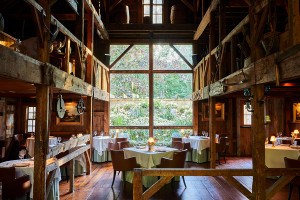Restaurant Review: Puritan & Company in Cambridge

The bustling space at Puritan & Co., the newest restaurant to open in Inman Square. (Photos by Anthony Tieuli)
The current local-everything mania ascends to a new level at Puritan & Company, the latest addition to Inman Square. For the first time, a kitchen is entirely inspired by New England ingredients and traditions, but is also embracing the latest equipment and techniques. Its goal—to bring a regional style associated with the 18th and 19th centuries forward into the 21st—is an admirable one, made almost mandatory today for any serious chef thanks to the global success of Noma, a fashionable Copenhagen restaurant championing the “New Nordic Cuisine.”
Will Gilson, a born-and-bred New Englander whose roots here date back 13 generations, would seem ideally pedigreed to create the New New England menu. Gilson has been a rising star since he was in his teens, when his father, David, would brag about him to chefs who bought herbs from the Gilson family’s farm stand at the Government Center market. In his twenties, he garnered fans as the executive chef at Garden at the Cellar, located between Harvard and Central squares, his five-year tenure at which was followed by a stint cooking at a summer-long pop-up restaurant in Truro, called Eat at Adrian’s.
Puritan’s menu lists plenty of dishes that echo New England’s past—“hardtack” crackers, “boiled dinner” vegetables—all, luckily, revisitations rather than reissues. (The crackers were buttery and flaky, unlike the fatless planks that were made for long storage on ships, and the vegetables were meticulously cut and presented.) But it isn’t as dominated by newly thought-out dishes from hand-me-down cookbooks as some of the advance press suggested it would be. This is what ballsy chefs, not quaint farm wives, make, though the plates do feature ample garnishes of items you’d find on a farm like the Gilson family’s, which is in Groton: home-pickled radishes and the fresh year-round herbs that cemented Will’s father’s reputation with chefs.

Seared scallops with citrus and roasted-sweet-potato purée, $12
Certainly the feel, if not the food, is deliberately farmhouse, starting with the 1920s stove at the check stand that Gilson first cooked with in Groton (it was in an outbuilding called the Herb Lyceum, where the family hosts educational suppers) and going on to the weathered-barn-wood accents, communal wooden tables, mismatched heavy china, and lighting fixtures made of glass Mason jars encasing (the now-inescapable) glowing-filament Edison bulbs. Together, it all reads as a strongly personal statement from an ambitious chef influenced by both the local movement and the high-style presentations of Noma and its modernist successors.
The restaurant is named not for Gilson’s ancestors but for a baking company that once occupied the airy, loftlike premises. Merciful sound panels dropped from the ceiling make this the rare big, brick-walled restaurant that has pleasant, rather than unbearable, background noise. Servers are friendly, casual, and excited about their work—glad to taste a number of wines themselves to see if the night’s by-the-glass offerings might meet the preferences you’ve described.
With the young vibe of the staff, you’ll find plenty of snout-to-tail cooking, of course. It’s worth ordering the charcuterie (minus the chewy, oily duck prosciutto), particularly the potted foie gras ($14), which is covered with a clear apple gelée and bubbles of agar-set sherry “beads” and served in a little brown bean pot (the only New England touch). It was very sweet, “like the breakfast spread of a really rich person,” as a guest remarked. Swordfish “pastrami” ($13) was more like a gravlax, but bright-flavored and a lovely way to use seldom-sold swordfish bellies.

Smoked-mackerel pâté with hardtack crackers, $7


